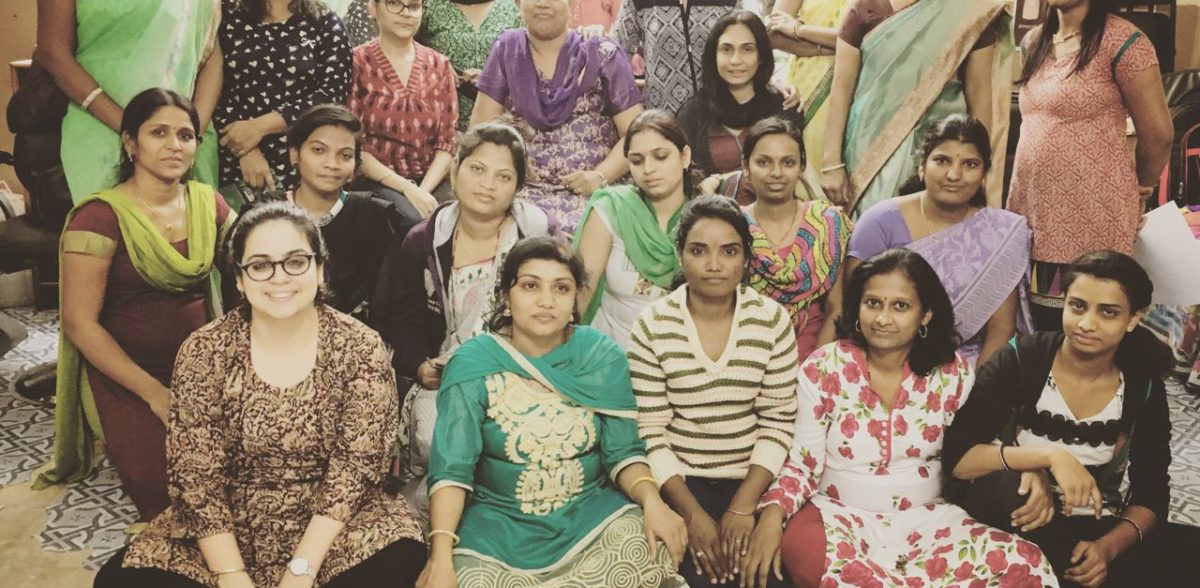Safecity’s second workshop in association with Godrej

Sumati Thusoo is a Program and Outreach Officer with Safecity. She is responsible for engaging with the communities and establishing and maintaining partnerships with NGOs and colleges, conducting workshops with colleges and raising awareness regarding sexual violence and providing input for developing appropriate training programmes. Her past work has focused on the effects of conflict on access and mobility of women, and her thesis looked at the experiences of Kashmiri women with conflict.
Safecity’s second workshop in association with Godrej
Safecity’s second workshop in association with Godrej was held in Pune on 10th November. It was attended by a group of 20 women who have been trained under Godrej Saloni programme which is one of its employability programmes for girls and women from low-income families.
The first part of the workshop consisted of facilitating an interactive session about what makes women feel safe and unsafe, both in their private spheres and the public spheres. A lot of women answered keeping their children in mind wherein they said that not knowing the conductor of the bus in which their children go to school made them feel unsafe along with not knowing the environment in the school. It also shows that every time a woman is asked about safety, she thinks of her role as a caretaker which is a part of her gender role and doesn’t think about her personal safety. This also helped us set up a premise for the latter part of the day where we spoke about Child Sexual Abuse and laws pertaining to the same.
The first part consisted of engaging in conversations around sexual harassment, how to file an FIR, why is it important to report a crime etc. We then spoke about sexual harassment at the workplace and the mandates pertaining to the formation of an Internal Complaints Committee in any organisation that has more than 10 employees.
In this workshop, we divided the participants into two groups. One group was asked to enact a scenario of sexual harassment on the street and the reporting of the same whereas the other group was asked to form an ICC and resolve a sexual harassment complaint at an organisational level.
In the first role play, there were a few participants who were whistling at some college going girls and passing lewd comments. Seeing this, a few senior citizens intervened and took these miscreants to the police station. When the police constable asked, the boys were in absolute denial about doing anything whereas the senior citizens and the girls compelled the constable to write the complaint. When he didn’t look interested in writing the complaint, they went to his reporting official and complained to him and got an FIR filed and asked for a copy of it. This role play not only helped the group understand that anything that is not physical but suggestive is also sexual harassment and can be complained about. Apart from that, it also taught a lot about bystander intervention. There were little nuances like one of the participants asking for a copy of FIR and saying that they would follow up on the same which was quite interesting to see.
The second role play was about handling a sexual harassment complaint under ICC in a beauty parlour where a customer misbehaved with a beauty specialist who was supposed to give him a massage. In this act, they formed a committee which consisted of a person from an NGO, two employees from the parlour, a senior level employee from the organisation. It was interesting to see how the members of the committee through their words made this act absolutely non-negotiable even after the miscreant apologised to the complainant. It was also quite interesting to see when one of the members of the committee explained that it is the duty of the accused to prove his innocence and not the victim’s duty to prove that she/he has been harassed.
Both these role plays were an interesting way to see how nicely the participants picked up the little details about the information that was given regarding the law. Not just that, there were a lot of personal incidents that were narrated by various participants in the safe space that we created for ourselves in that room which at times made us emotional and at others gave us strength.


